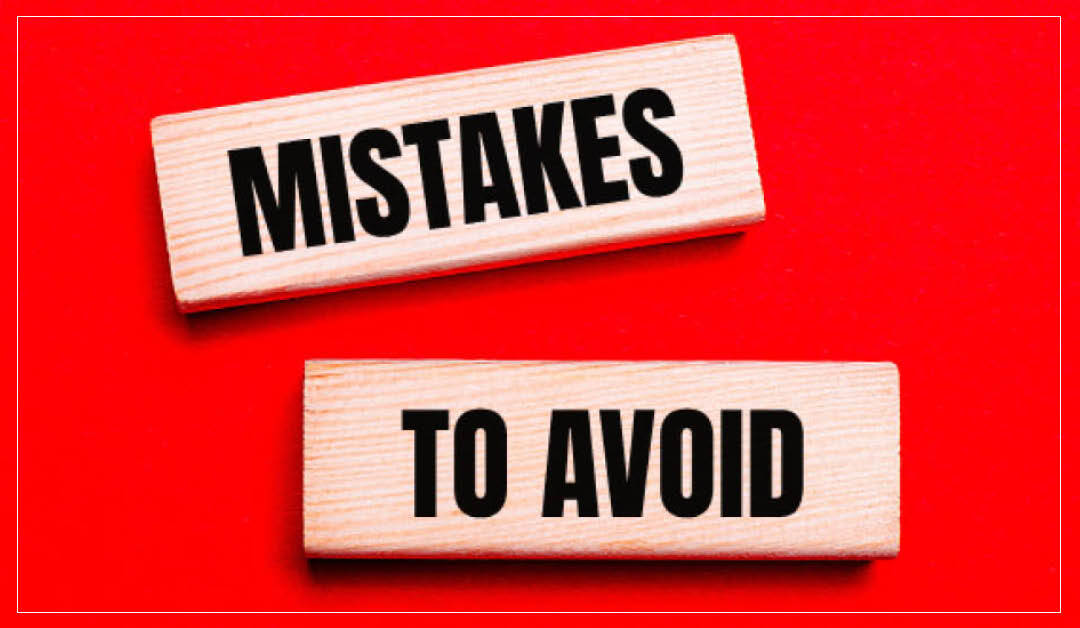6 Event Planning Mistakes You'll Want to Avoid
When an event is executed with precision, it’s a thing of beauty. It starts with thorough, fine-tuned planning, allowing stakeholders to feel ownership over the process while avoiding major setbacks. The result? A memorable experience that makes attendees want to return for more.
When event planning best practices are ignored, however, the runway to an event can become a mad scramble marked by stress, headaches, and unpleasant surprises, with lost ROI virtually assured.
At Stagedge, we’re passionate about helping event planners set the stage for success. If you want to pull off an outstanding event without missing a beat (or feeling beaten!), read our list of the 6 biggest event planning mistakes—along with expert tips on how to avoid them.

Event Planning Mistake 1. Not Enough Lead Time
Many event teams get started late—sometimes a little more than a month in advance for an internal event, like a sales kickoff—and hastily begin looking to book a venue and vendors. This 11th-hour strategy is problematic for several reasons:
- You can’t fully develop your theme. You won’t have the time to produce scenery, signage, and other elements needed to create a cohesive, inspiring feel. This will make the event feel less cohesive and more “last-minute.”
- Key talent might not be available. Producers, creative and art directors, executive video producers, video and audio engineers, lighting directors, streaming engineers, and others are usually booked at least a year in advance.
- Your outsourcing costs will increase. You’ll need to pay more to book people and spaces at the last minute, and your ability to negotiate will drop dramatically.
How far out should you begin the event planning process for a large event? According to the experts at Stagedge: at least a year.
For many of our larger companies and contracts,” says Stagedge Director of Production Richard “Mank” Mankiewicz, “we’re planning for 2026.
Event Planning Mistake 2. Waiting Too Long To Enlist An Event Production Company
The search for an event venue can be daunting. If you go it alone, without the benefit of expert guidance, you might fail to ask critical questions that allow for the proper evaluation of the venue.
- Do we need a more upscale vibe?
- Will a sit-down dinner fit in the space?
- Can this room layout accommodate the needs of the technical team?
- Is there enough room to load and unload our trucks?
There could be serious problems hidden in the contract as well. If the venue doesn’t allow additional days for setup and breakdown, for example, it could be disastrous for your event.
Your safest bet is to partner early with an event production company and take advantage of that expertise,” says Aaron “Reno” Brown, senior technical director for Stagedge. “Have them vet the venue and the contract so you’ll know whether you can actually do what you want to do in that event space
Event Planning Mistake 3. Jumping Into Planning Without a Theme
An event theme isn’t a nice-to-have, nor is it exclusively for large industry gatherings. For any event to succeed—whether it’s internal or external, large or small—attendees need to see and understand the energy, purpose, and vision. Event branding not only ties everything together but also drives staging, lighting design, set pieces and graphics, and more.
Before you jump headlong into the event details, ask yourself some basic questions:
- Who are we as a company?
- What’s the meaning and purpose of this gathering?
- What message should attendees be leaving with?
The Stagedge team routinely brainstorms ideas with clients before developing theme and branding options—including logos. For one client, an “Evolve” theme emerged as Part III (following two previous events) of a larger company story. Because the event was held in Cancun, the team used earth, wind, fire, and water elements to tie together the set pieces, graphics, app, and website.
Without a thematic look and feel, attendees are left to wonder if the meeting could have been an email,” says Technical Director Daryl Pauley. “We encourage our clients to come to the table with some ideas. Then we help refine them, proposing concepts and branding that can elevate the entire event.

Event Planning Mistake 4. Inadequate On-Site Prep Before the Event
When it comes to on-site event preparation, it’s important to set aside extra time for setup, strike, and rehearsals. Unfortunately, for many event teams, this isn’t top-of-mind. And don’t count on your venue to remind you, as many aren’t keen on granting access to conference space when there are no guests in the hotel.
Another common mistake is not giving production crews the extra day they require for setup. This forces them to squeeze it all in quickly, which can lead to mistakes and added stress. Not only will you end up paying overtime for a crew to work into the night—meaning they will be during the event itself—but executives won’t have the time they need to rehearse and experience what it’s like being onstage.
Remember: you need a production crew that’s ready to hit the ground running on day one, and your executive speakers need to look good. Prioritize and balance these final pre-event hours accordingly.
- Event Planning Mistake 5. No Clear-Cut Roles and Responsibilities
Who’s in charge? This is a critical question to ask at the start of the planning process in order to avoid “death by committee”—a common phenomenon in the event planning space. When this happens, everyone is reluctant to make decisions, the events team struggles to stay aligned, and various stakeholders toss out last-minute changes that upend previous efforts.
To ensure a smooth planning process, take the following steps:
- Designate a point person who will serve as the main contact for vendors and has the authority to make decisions.
- Assign leadership roles related to various aspects of the event, from creative to logistics.
- Schedule regular checks with senior leadership to get their early buy-in and ensure the event is going in the right direction.
- Bring in the creative department so they can share and enforce branding guidelines (logo usage, colors, etc.).
- Establish a timeline with specific dates for approvals.
On larger projects, we have an executive producer and a project manager who run the timeline for the whole project and conduct all meetings,” says Mank. “As the planning progresses, different teams break out into different meetings with increasing frequency. Here at Stagedge, we use the Monday.comproject management app to keep everything transparent and on track.
Event Planning Mistake 6. No Plan to Repurpose Content After the Event
Multiple presentations and demos, your top executives all gathered together, laughter and photo-ops: an event is a gold mine for content. But what happens when event teams don’t have a plan for capturing or making full use of this content? The opportunity costs can be significant.
Consider the many ways you can repurpose the following event content (including promoting next year’s event):
- B-roll footage of speaker and attendee interviews
- Professional photos
- Opening, closing, and recap event videos
- Speaker presentation videos
- Breakout session recordings
You don’t want to wait till halfway through the event to decide you want to capture photos or video. Not only will you incur higher costs, but you’ll need to schedule post-production work as well.
The earlier you plan for post-event content creation, the better,” says Chris Casimiro, technical director at Stagedge. “We always ask our clients these questions to make sure they’re thinking ahead, and work with them to ensure everything they need is part of the scope of work. We want them to get the most value they can, long after their event is over.
--
The Right Partner Can Make or Break an Event—But How To Choose?
With the average company spending 21% of its marketing budget on events annually, the pressure to perform is high. Finding the right partner to help you with event production services is a key ingredient for success, saving time and money as you vet venues and vendors, and ensuring the end result is seamless and sophisticated. Wondering what to look for in a good partner? We’re so proud of our process that we wrote an entire guide, From Discovery to Debrief: Walking Through Stagedge's Client Journey, explaining what it’s like to work with us. Take a look! It’s a quick, un-gated download.
Stagedge: Creating Immersive Experiences for 50 years is proud to be one of Boston's leading full-service event production companies, dedicated to conceiving, creating, and executing immersive brand experiences through live, virtual & hybrid events domestically, and around the world.
